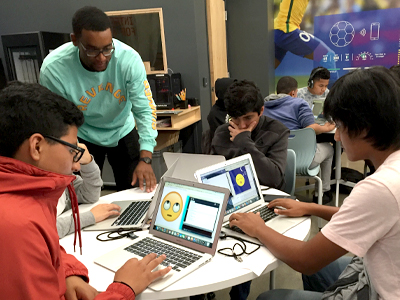Google lab opens in Fruitvale
A new project to find and foster the next generation of Hispanic and black tech leaders recently launched in Oakland. After a one-year pilot program, Google launched their first Code Next site in Fruitvale Village, where Oakland teens can learn coding and other computer science skills in a youth training program developed with the MIT Media Lab.
“A lot of folks have been asking, ‘why Oakland?’,” said Nilka Thomas, Google’s Director of Diversity and Inclusion. “We want to make sure that the next generation of tech leaders come from Oakland — and are black and Latino. They’re going to do things to this industry that we cannot imagine or believe.”
The program is offered at no charge; teenagers are referred by their schools or community organizations such as Hack the Hood, Hidden Genius Project, Level Playing Field or Unity Council. Claire Shorall, manager of computer science for the Oakland Unified School District, told USA Today that the Google’s education lab will offer an after-school program for middle-school students as well as other opportunities to teach computer science to local kids.
Google’s research shows that 51 percent of black students and 47 percent of Hispanic students don’t have access to computer science (CS) classes in school. Without this access, students are unable to discover an interest in computer science or be inspired by the possibilities that come along with it. Code Next aims at filling this gap with a curriculum to get students started, and provides opportunities that may have been otherwise out of reach.
“This partnership shows that Google recognizes that the youth of Fruitvale and Oakland are an asset, and they are worth investing in,” said Chris Iglesias, Chief Executive Officer of The Unity Council. “Additionally, this is not just about Fruitvale and Oakland youth that need to do the learning here – it’s about Google understanding the communities its working in and how it can do its business in a way that is more sensitive to economic inclusion and diversity.”
Designed to be fun and culturally-relevant, the training program focuses on general CS concepts. Participants drive their own projects — such as designing and programming a robot and 3D printing an Android chess set — and after months of learning, become creators of technology that they can share with their community.
The Oakland location is a 1,500-square-foot lab conceived in collaboration with MIT Media Lab and The Unity Council. The space includes a computer science lab and engineering lab, as well as a leadership lab where students can discuss the cultural aspects of their tech projects.
“We selected Oakland based on density of the target student population and commitment to CS education at both the grassroots and partner levels,” says Thomas. “In the long term, our goal is to open-source the curriculum to educators everywhere.”
“During my visits to the pilot program, I was humbled by the participants’ questions, focus and commitment,” adds Thomas. “Looking out over a crowd of 30 young people coding, white-boarding, and 3D printing — all while celebrating each other’s company — convinced me that Code Next has power to transform both our industry and the communities in which we live.”


